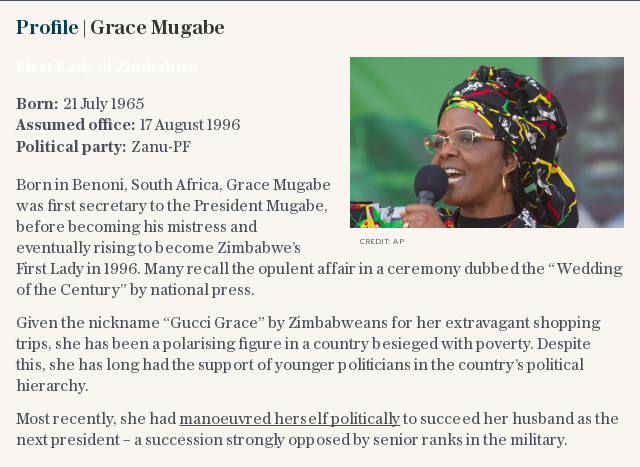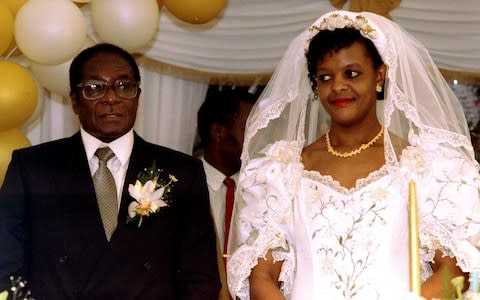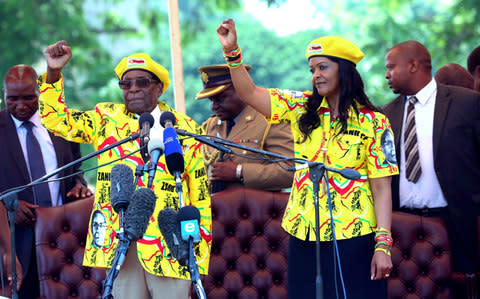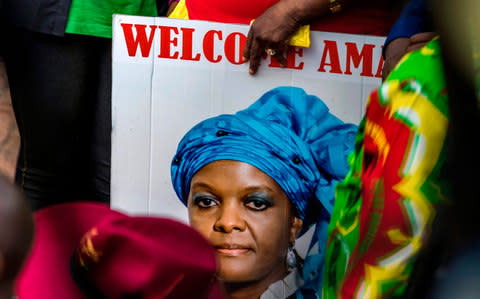Everything you need to know about 'Gucci' Grace Mugabe

Only a few months ago, Grace Mugabe, the volatile and tenacious First Lady of Zimbabwe, was seen as a potential kingmaker in her country’s succession politics. Last week, it seemed almost certain that she would become the heiress herself.
This morning, she may well be running for her life.
After a night of gunfire and explosions in Harare that has seen the military take control, President Robert Mugabe, ruler of Zimbabwe since its independence in 1980, is apparently safe and well at home - if a little ousted.
The whereabouts of his wife, though, are much less clear. But reports suggest she may have fled to Namibia and applied for protection at the border. South Africa, the country of her birth, might have been the more obvious option for sanctuary – were it not for fact she is still wanted there for allegedly assaulting a 20-year-old model with a plug in August.
She may well need protection. For Mrs Mugabe, 52, has viciously divided opinion across Zimbabwe for years.
Some might have made their minds up when she was revealed to be a big-spending shopaholic in a country ravaged by poverty. Others could have been put off by any of a number of violent outbursts over the last decade; and for many, it will have been her ruthless accumulation of personal political power which left a bitter taste.
That came to a head last week, when the 93-year-old President Mugabe removed his deputy, Vice President Emmerson Mnangagwa, replacing him with his wife.

During Robert Mugabe’s 37-year dictatorship, it has often appeared that nothing could seriously challenge his power. The rise of his wife changed that.
So where exactly did she come from?
The origin story

Grace Marufu was born in Benoni, a town in northern South Africa, in 1965, moving with her family to Zimbabwe aged five. By the time she was in her 20s, she had married an air force pilot named Stanley Goreraza, with whom she had a son, Russell.
After taking a job as a secretary in Zimbabwe State House, Mugabe’s official residence in Harare, she met the president in both an official capacity and, with increasing frequency, during tea breaks between meetings.
“He came to me and started asking about my family," she once said of their first encounter. "I looked at him as a father figure. I did not think he would at all look at me and say: 'I like that girl'. I least expected that.”

Robert Mugabe is 41 years older than Grace, yet that never stood in the way of their office romance. Both were still married but the president's first wife, Sally, was terminally ill, and is said to have given her blessing to the couple before her death in 1992.
Goreraza was also understanding – or, at least, as understanding as is necessary when your wife runs away with a dictator – and remains on good terms with the pair. He went on to work for the government.
Before they married in an extravagant Catholic ceremony in 1996, President Mugabe and Grace had two children, a daughter, Bona, and Robert Jr (known as Rob). A third, Chatunga, was born the following year.
The spending
Grace Mugabe quickly became both a forceful businesswoman and a controversial figure over the coming years, not least thanks to her spending habits. The shopping trips and designer clothes earned her the nicknames “Gucci Grace” and “DisGrace” - and that wasn’t exactly unmerited, during a crippling financial crisis, that saw many Zimbabweans in poverty.

During one bout of retail therapy in Paris in 2002, she is said to have spent more than £120,000. She has been spotted in expensive department stores all over the world, and built herself a palace. When criticised for the latter, she insisted it was paid for by her 1980s secretarial salary.
“The only thing I’ve bought in Harrods is almond nuts, because I eat lots of almond nuts. I want to eat healthily… I go out and they say she’s bought clothes with a million pounds,” she complained to an interviewer in 2013.
In-part to halt her spending while the regime continued, Mrs Mugabe is under sanctions from both the EU and US to block purchases.
The famous temper
As she grew more accustomed to her role in the public eye, so too did Mrs Mugabe’s confidence – and acid tongue. She won fans for being forthright and strong, especially among young and ambitious politicians, but her temper sometimes spilled over.
“I might have a small fist but when it comes to fighting I will put stones inside to enlarge it. Do not doubt my capabilities,” she once said.

She used those tiny fists to effect in 2009, when she ordered her bodyguard to punch photographer Richard Jones outside a luxury hotel in Hong Kong, where Bona was a university student. Mrs Mugabe then joined in, hitting him in the face with diamond-encrusted knuckles, causing cuts to Jones’s face. The Chinese government awarded her immunity, in part thanks to her status, and possibly in part thanks to theirs as Zimbabwe’s biggest trading partner.
She made international headlines again in August, when it was alleged she had assaulted a 20-year-old model, Gabriella Engels, in Johannesburg. The model and her friends were in the company of Rob and Chatunga, Mrs Mugabe's sons, when trouble started.
Mrs Mugabe is said to have lost her temper, grabbed an extension cord attached to a plug, and beaten Engels with it.
A post shared by Chatunga Bellarmine Mugabe (@chatungamugabe) on Aug 18, 2017 at 2:20am PDT
Engels posted a picture of a deep cut on social media; Grace never arrived at her court hearing before receiving immunity again; and as for her sons – who, incidentally, have inherited their mother’s spending habits – they made light of the whole thing on social media.
Life as an academic
If you read the following quotation, you could be forgiven for thinking Grace Mugabe isn’t the sharpest tool in the Zimbabwean cabinet.
“Girls have a higher chance of falling pregnant than boys. If you look at the statistics, girls have nearly 100 per cent chance of getting pregnant, while boys have nearly zero chances of falling pregnant. This means girls have to be extra, extra vigilant.”

As it happens, she apparently possesses a PhD, meaning she is referred to as Dr Grace Mugabe at all times. The doctorate was given to her just two months are after enrolled at the University of Zimbabe, to study sociology, in 2014.
It was the shortest time anybody had ever completed the course, and her final thesis does not exist anywhere in the university’s library.
The power play
For years, Mrs Mugabe insisted her husband would never cease being leader of Zimbabwe. She declared that “we are going to create a special wheelchair for President Mugabe until he rules to 100 years, because that’s what we want”.
When the possibility of his eventual death was mooted, she had a plan for that, too. “If God decides to take him,” she said, “then we would rather field him as a corpse.”
All the while, her own creep towards the seat of power was very much on. With her degree adding an air of gravitas, in 2014 she began to appear at campaign events all over the country, and took over leadership of the women’s wing of her husband’s ruling party, Zanu-PF.

She then spent years intermittently touring Zimbabwe’s provinces, making speeches attacking her husband’s rivals, and shrewdly creating a kingmaker role for herself. Many people liked her rough style and passionate criticisms of the president's opponents.
To those opponents and the army, however, it became clear that whoever would eventually take his place would need to get through her first. And when she replaced Vice President Emmerson Mnangagwa last week, it proved the final straw.
Mrs Mugabe may now be on the run, but don’t expect her to go quietly.

